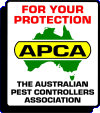Unfortunately, the Australian
pest control industry has a mixed reputation ... good and bad.
It is far too easy to start up a pest control business employing
people to use the hazardous pesticides who do not have the training
to provide a safe and effective service.
 . . |
"Happy Haphazard" pest sprays ... done dirt cheap
Unrealistic price cutting and resultant inadequate servicing are common-place with some companies operating from a rented residence using a mobile phone number. Here today - gone tomorrow.
Such low pricing can be acheived by providing a sub-standard service using trainee operators and the cheaper old style more toxic pesticides - a hazard to themselves and the general public.
The modern technology products are far safer but much more expensive and require a higher level of skill to ensure an effective result.
|
In most cases, a serious termite infestation will require the use of some chemicals, in order to minimise the risk of continued termite infestation and severe timber damage to a building. However, there are modern products and technologies available to suit environmentally sensitive situations.
After a thorough inspection and detailed written report on the premises, your termite professional should recommend a range of termite control methods suited to your particular circumstances, with an emphasis on safety and effective protection of the premises. |
 |
PLEASE NOTE: home insurance does NOT cover termite damage to the timbers in a building. A chemical soil barrier treatment should provide an effective barrier against termites for over five years.
The most common consumer complaint is that the Company has NOT done the job properly "the termites are back causing major damage" and the Company has disappeared, leaving the home-owner with the problem. |
| APCA Consumer Advice on Selecting a Pest Controller |

 |
Extracts from APCA Bulletin on Selecting a Professional Pest Controller
Selecting a professional pest controller that will provide an appropriate "value for money" safe and effective service can be a daunting task. Your enquiries should focus on whether the business is a solid company in case a problem arises in the future, the level of expertise, insurance cover, any warranties applicable and the safety aspects employed.
|
 Obtain
several quotes and check out each of the companies. First enquire as
to how long the business has been established. Do they have a good reputation
in the market-place. Are they a member of a recognised Pest Control Association? Obtain
several quotes and check out each of the companies. First enquire as
to how long the business has been established. Do they have a good reputation
in the market-place. Are they a member of a recognised Pest Control Association?
 Ask
questions about termites and the different treatment options the company
employs, the chemicals used, their toxicity and safety aspects. Compare
notes on the methods of each company. Which company seems the more professional? Ask
questions about termites and the different treatment options the company
employs, the chemicals used, their toxicity and safety aspects. Compare
notes on the methods of each company. Which company seems the more professional?
 Make
sure the company carries professional indemnity and public liability insurance
for their termite control services and inspection reports. Make
sure the company carries professional indemnity and public liability insurance
for their termite control services and inspection reports.
 Be
present during the termite inspection. Study the general presentation
of the inspector, such as, was the inspector in company uniform, with proper
identification? Did he/she arrive in a tidy motor vehicle and use quality
equipment, including a moisture meter? Was a thorough inspection carried
out? Were you presented with informative documentation regarding the inspection
findings and treatment proposals? Did he/she adequately explain the alternatives
so you are confident he/she knew his/her subject matter? Were there any
other aspects that may indicate professionalism or otherwise? Make notes
and comparisons. Be
present during the termite inspection. Study the general presentation
of the inspector, such as, was the inspector in company uniform, with proper
identification? Did he/she arrive in a tidy motor vehicle and use quality
equipment, including a moisture meter? Was a thorough inspection carried
out? Were you presented with informative documentation regarding the inspection
findings and treatment proposals? Did he/she adequately explain the alternatives
so you are confident he/she knew his/her subject matter? Were there any
other aspects that may indicate professionalism or otherwise? Make notes
and comparisons.
 Enquire
as to the experience of the termite inspector. Does he/she have a current
pest controller license (and not just a trainee permit). You should cite
his/her NSW Govt issued pest controller license,
noting name, number and expiry date. Enquire
as to the experience of the termite inspector. Does he/she have a current
pest controller license (and not just a trainee permit). You should cite
his/her NSW Govt issued pest controller license,
noting name, number and expiry date.
 Enquire
as to whether the company uses employees or sub-contractors. Be wary
of companies with sub-contractors as problems often occur in the market
place where sub-contractors are obliged to pay for the supply of chemical
and other costs but do not assume responsibility if the service proves to
be inadequate at a later date. Enquire
as to whether the company uses employees or sub-contractors. Be wary
of companies with sub-contractors as problems often occur in the market
place where sub-contractors are obliged to pay for the supply of chemical
and other costs but do not assume responsibility if the service proves to
be inadequate at a later date.
 Ask
about any applicable back-up service period. For example, a company
may provide you with a twelve month "FREE service period" for a chemical
soil barrier treatment where the termite controller is confident a complete
barrier is in place around the entire foot-print of the building. This annual
service period may be extended annually thereafter (at the customers option)
provided necessary regular inspections and other essential control measures
are carried out as recommended. Ask
about any applicable back-up service period. For example, a company
may provide you with a twelve month "FREE service period" for a chemical
soil barrier treatment where the termite controller is confident a complete
barrier is in place around the entire foot-print of the building. This annual
service period may be extended annually thereafter (at the customers option)
provided necessary regular inspections and other essential control measures
are carried out as recommended.
 Be
wary of companies that offer a 10 or 20 year warranty as this commits
you for that period, so you have to obtain (pay for) regular inspections
and other work whether or not you want it. Such a long term warranty offer
is usually unrealistic and a sign of short-term intentions. Be
wary of companies that offer a 10 or 20 year warranty as this commits
you for that period, so you have to obtain (pay for) regular inspections
and other work whether or not you want it. Such a long term warranty offer
is usually unrealistic and a sign of short-term intentions. |



